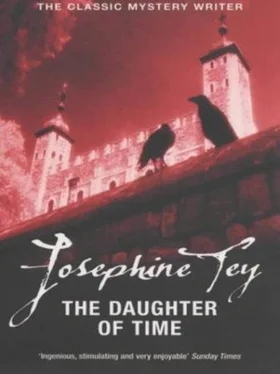‘There was one person you forgot to ask for,’ Carradine said, breezing in, very gay, some days later, ‘in your list of kind inquiries.’
‘Hullo. Who was that?’
‘Stillington.’
‘Of course! The worthy Bishop of Bath. If Henry hated Titulus Regius, as a witness of Richard’s integrity and his own wife’s illegitimacy, he must still more have disliked the presence of its instigator. What happened to old Stillington? Judicial murder?’
‘Apparently the old boy wouldn’t play.’
‘Wouldn’t play what?’
‘Henry’s pet game. Out goes he. Either he was a wily old bird, or he was too innocent to see the snare at all. It’s my belief – if a mere Research Worker is entitled to a belief – that he was so innocent that no agent provocateur could provoke him to anything. Not anything that could be made a capital charge, anyhow.’
‘Are you telling me that he defeated Henry?’
‘No. Oh, no. No one ever defeated Henry. Henry put him on a charge and conveniently forgot to release him. And never home came he. Who was that? Mary on the sands of Dee?’
‘You’re very bright this morning, not to say exhilarated.’
‘Don’t say it in that suspicious tone. They’re not open yet. This effervescence that you observe in me is intellectual carbonisation. Spiritual rejoicing. An entirely cerebral scintillation.’
‘Well? Sit down and cough up. What is so good? I take it that something is?’
‘Good is hardly the proper word. It’s beautiful, perfectly-holy beautiful.’
‘I think you have been drinking.’
‘I couldn’t drink this morning if I tried. I’m bung full, full up to the gullet’s edge, with satisfaction.’
‘I take it you found that break in the pattern we were looking for.’
‘Yes, I found it, but it was later than we had thought. Later in time, I mean. Further on. In the first months everyone did what you would expect them to do. Henry took over – not a word about the boys – and cleaned up, got married to the boys’ sister. Got his own attainder reversed by a Parliament of his own attainted followers – no mention of the boys – and got an act of attainder through against Richard and his loyal subjects whose service was so neatly made treason by that one day’s ante-dating. That brought a fine heap of forfeited estates into the kitty in one go. The Croyland monk was terribly scandalised, by the way, at Henry’s sharp practice in the matter of treason. “O God,” he says, “what security are our kings to have henceforth in the day of battle if their loyal followers may in defeat be deprived of life, fortune, and inheritance”.’
‘He reckoned without his countrymen.’
‘Yes. He might have known that the English would get round to that matter sooner or later. Perhaps he was an alien. Anyhow, everything went on just as you would expect things to go with Henry in charge. He succeeded in August of 1485, and married Elizabeth the following January. Elizabeth had her first child at Winchester, and her mother was there with her and was present at the baptism. That was in September 1486. Then she came back to London – the Queen Dowager, I mean – in the autumn. And in February – hold on to everything – in February she was shut in a convent for the rest of her life.’
‘ Elizabeth Woodville? ’ Grant said, in the greatest astonishment. This was the very last thing he had expected.
‘Yes. Elizabeth Woodville. The boys’ mother.’
‘How do you know that she didn’t go voluntarily?’ Grant asked, when he had thought of it for a little. ‘It was not an uncommon thing for great ladies who were tired of court life to retire into an Order. It was not a severe existence, you know. Indeed, I have an idea it was fairly comfortable for rich women.’
‘Henry stripped her of everything she owned, and ordered her into the nunnery at Bermondsey. And that, by the way, did create a sensation. There was “much wondering”, it appears.’
‘I’m not surprised. What an extraordinary thing. Did he give a reason?’
‘Yes.’
‘What did he say he was ruining her for?’
‘For being nice to Richard.’
‘Are you serious?’
‘Sure.’
‘Is that the official wording?’
‘No. That’s the version of Henry’s pet historian.’
‘Virgil?’
‘Yes. The actual order of council that shut her up, said it was “for various considerations”.’
‘Are you quoting?’ asked Grant, incredulous. ‘I’m quoting. That’s what it said: “For various considerations”.’
After a moment Grant said: ‘He had no talent for excuses, had he? In his place I would have thought up six better ones.’
‘Either he couldn’t be bothered or he thought other people very credulous. Mark you, her niceness to Richard didn’t worry him until eighteen months after he succeeded Richard. Up till then everything had apparently been smooth as milk. He had even given her presents, manors and what not, when he succeeded Richard.’
‘What was his real reason? Have you any suggestion?’
‘Well, I’ve another little item that may give you ideas. It certainly gave me one hell of a big idea.’
‘Go on.’
‘In June of that year—’
‘Which year?’
‘The first year of Elizabeth’s marriage. 1486. The year when she was married in January and had Prince Arthur at Winchester in September, with her mother dancing attendance.’
‘All right. Yes.’
‘In June of that year, Sir James Tyrrel received a general pardon. On the 16th June.’
‘But that means very little, you know. It was quite a usual thing. At the end of a period of service. Or on setting out on a new one. It merely meant that you were quit of anything that anyone might think of raking up against you afterwards.’
‘Yes, I know. I know that. The first pardon isn’t the surprising one.’
‘The first pardon? Was there a second one?’
‘Yes. That’s the pay-off. There was a second general pardon to Sir James exactly a month later. To be exact on the 16th July, 1486.’
‘Yes,’ Grant said, thinking it over. ‘That really is extraordinary.’
‘It’s highly unusual, anyway. I asked an old boy who works next me at the B.M. – he does historical research and he’s been a wonderful help to me I don’t mind telling you – and he said he had never come across another instance. I showed him the two entries – in the Memorials of Henry VII – and he mooned over them like a lover.’
Grant said, considering: ‘On the 16th June, Tyrrel is given a general pardon. On the 16th July he is given a second general pardon. In November or thereabouts the boys’ mother comes back to town. And in February she is immured for life.’
‘Suggestive?’
‘Very.’
‘You think he did it? Tyrrel.’
‘It could be. It’s very suggestive, isn’t it, that when we find the break in the normal pattern that we’ve been looking for, Tyrrel is there, on the spot, with a most unconscionable break in his own pattern. When did the rumour that the boys were missing first become general? I mean, something to be talked openly about.’
‘Quite early in Henry’s reign, it would seem.’
‘Yes; it fits. It would certainly explain the thing that has puzzled us from the beginning in this affair.’
‘What do you mean?’
‘It would explain why there was no fuss when the boys disappeared. It’s always been a puzzling thing, even to people who thought that Richard did it. Indeed, when you come to think of it it would be impossible for Richard to get away with it. There was a large, and very active, and very powerful opposition party in Richard’s day, and he left them all free and scattered up and down the country to carry on as they liked. He had all the Woodville-Lancaster crowd to deal with if the boys had gone missing. But where interference or undue curiosity was concerned Henry was sitting pretty. Henry had got his opposition party safely in jail. The only possible danger was his mother-in-law, and at the very moment when she becomes capable of being a prying nuisance she too is put under hatches and battened down.’
Читать дальше












